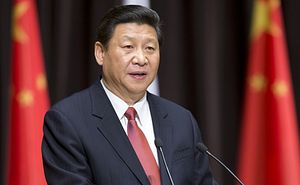As Australian Prime Minister Tony Abbott is accused from almost every direction of breaking promises with his savage May budget, it’s a good time to think about the role obligations and vows play in different political environments. In democracies, promises are usually made during election campaigns, and are targeted at swing voters or key constituencies whose support is needed either to get an incumbent back into office or to allow an aspiring candidate to steal the crown. In China, where there are no meaningful participatory national elections, the question might be whether politicians make promises at all. The closest that Xi Jinping and his leadership colleagues come to an election promise in the style of European, American, or other democracies is when they stand at a large public event like the annual National People’s Congress or one of the Party plenums and make statements about growth or economic targets. Not surprisingly, they always fulfill these targets.
Almost two years have passed since Xi and the new leadership emerged. The way in which they were selected and elevated is still mysterious. But deals were certainly made, either at Beidaihe or elsewhere. There was nothing as neat and easy as one faction promoting its candidate and another putting up theirs. More likely, specific individuals like Xi, Li Keqiang, and the people who turned out to be their fellow Politburo Standing Committee members were each highly active in building diverse support networks, either from the provinces and businesses they had been closest to or from ministerial, military, and other sources of support. In a campaign where no one could overtly go on the stump, people were clearly carefully putting together their networks. One of the most powerful sources of support came from former elite leaders, who seem to have granted the final nod to the succession line up. But there was nothing sentimental about this; aspiring leaders had to gain credibility through their political and economic achievements to get this support. Perhaps it was to these elderly elites, in the most private and enclosed of spaces, that promises were made.
There is another core support group surrounding any leader in modern China, one to whom promises must be kept. Historian Mark Edward Lewis, writing about the long and disunited interim from 300 to 580 AD, between the Han and Tang dynasties, explores how China became ruled not by dominant individuals but by family groups. “The most eminent families remained committed to the empire as a source of wealth and status that distinguished them from the thuggish military men, greedy merchants and boorish landlords,” he writes in China Between Empires. There are profound differences between China in the Northern and Southern Dynasties and China today. But both then and now, the primacy of the family and the strength of its bonds to specific power players are striking.
As Bloomberg and others have made clear in their tracking of top Chinese families, in the 21st century China seems to be returning to a family-run country rather than a place where individual imperial-style strongmen rule the roost. The family dynamics may well explain why Xi has so vigorously prosecuted his campaign against the grubby money-hungry arriviste Zhou Yongkang, who only has venal business men supporting him. It might also explain the story of the assembly of the Xi clan in 2008 in Beijing where the matriarch, Qi Xin, reportedly berated all the members for being too involved in making money and not focused enough on family honor.
In the family context, obligations are so strong that promises hardly need to be spoken, but they evidently exist. Family honor reigns supreme. Yes, honor involves wealth and power, but it is also something more than that. Seeing China as a place where leaders drum the beat of national greatness while at the same time they are prosecuting campaigns for their clan and tribal interests helps us to make a little more sense of the complexity and ambiguities in the way they speak. Their motivations and promises point in two directions – abstractly to the grand society in which they sit at the top, but more concretely to their own network of interests, the most crucial of which are family ones.
There is one promise that Xi Jinping has to live up to, which he alone can be sure he has fulfilled – the obligation he holds towards his family, and in particular his late father, former Party leader Xi Zhongxun. In an odd way, in modern China, the promises politicians make in the covert world of family linkages and clan bonds are probably more powerful than the ones democratic leaders make to their electorates. And Xi is far less likely to be away to walk away from these family obligations the way Abbott has moved away from the promises he made during the 2013 election.
Kerry Brown is Professor of Chinese Politics, and Director of the China Studies Centre at the University of Sydney. He is the author of The New Emperors, a new book on the leadership of modern China.

































